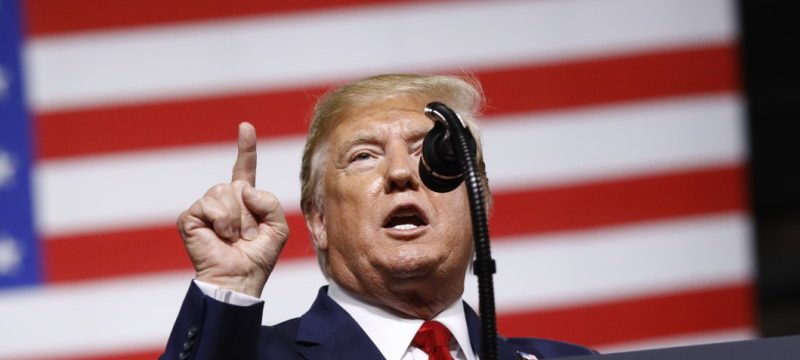What would happen if a sizeable proportion of the planet decided to ignore Donald Trump’s toxic tweets? Let his racist provocations about “bad hombres” and Baltimore’s “rat-infested” black neighbourhoods evaporate into the ether? Make him the tree that falls in the proverbial forest with no-one around to hear his “I’m-the-least-racist-person-in-the world” gaslighting?
Our Trump addiction is killing civic discourse.Credit:AP
I dwell on such impossible fantasies when reality takes a turn for the even worse.
Our Trump addiction is killing civic discourse. It might also be killing people. His flame-throwing about migrant “invasions” from “infested” countries intensifies the febrile climate that breeds radicalised white supremacists like the El Paso and Christchurch gunmen. (Whose bloody rampages possibly helped tip the alleged knife attacker over the edge in Sydney – police said he had in his possession a USB stick with information about the mass shootings overseas.)
Then again causation is a tricky concept in the US where racist violence needs little pretext to express itself.
I think former vice-president Joe Biden put it best recently when he said Trump has “publicly and unapologetically embraced a political strategy of hate, racism and division”. He has “no interest in unifying the nation”. A leading contender for the Democratic presidential nomination, Biden’s record suggests he has the potential to unify the nation. Whether he’d be the party’s best choice, I can’t say. But while we’re accustomed to watching presidential hopefuls tear each other down to win over their party’s faithful, I’m finding the spectacle surreal this time.
Because this time we have a president telling the four newbie congresswomen known as The Squad – three of them US born – to “go back” to the “broken and crime-infested” countries “from which they came,” implying people of colour aren’t real Americans. Against this background, it’s bizarre to see Biden, who is popular with African Americans, attacked in a Democratic debate for positions he took in the 1970s on mandatory busing to end segregation.
Surely when up against Trump’s brazen immorality, the Democrats should ditch their obsession with perceived moral purity? Why the looser Trump’s lips, the more relentlessly his opponents police the bounds of correct speech? Because if the Democrats believe – and they should – that for the good of civilisation Trump must be defeated, then they ought to be looking for a nimble and opportunistic street fighter.
US journalist James Kirchick, currently in Australia, described in Tablet magazine the almost Pavlovian response among Trump’s critics to his “every utterance and action”, such that “anything he supports must be opposed and anything he opposes must be supported, to the hilt and in abundance, causing them to embrace some of the worst of their own camp".
I’m not sure I’d put the case so strongly. Indeed, part of me is uncomfortable criticising Trump’s opponents because of the risk this might imply the two are morally equivalent. They’re not.
US congresswomen Rashida Tlaib, left, with Ilhan Omar, Alexandria Ocasio-Cortez and Ayanna Pressley.Credit:AP
But it is painful watching Trump wedge the Democrats. Forcing them, for instance, to repeatedly defend members of The Squad, whose radical positions range from the courageous and admirable, to the immature and divisive. The latest example is Trump prevailing upon Israel’s Benjamin Netanyahu to prohibit congresswomen Ilhan Omar and Rashida Tlaib from visiting Israel on a scheduled trip; Democrats protested Israel’s illiberal decision even though the congresswomen’s support for anti-Israeli boycotts offends the party’s mainstream.
And while Trump’s racism against them had to be called out, The Squad congresswomen also cynically exploit racial politics. In a spat with House Speaker Nancy Pelosi about their tactics and political heft, the four’s de-facto leader Alexandria Ocasio-Cortez accused the Democrats' elder stateswoman of going after them because of their skin colour. As cheap, bullying shots go, this was almost Trumpian. (Alas, at 29 the US constitution deems AOC too young to run for president.)
Squadista Ayanna Pressley of Massachusetts said in July: “We don’t need any more brown faces that don’t want to be a brown voice. We don’t need black faces that don’t want to be a black voice. We don’t need Muslims that don’t want to be a Muslim voice. We don’t need queers that don’t want to be a queer voice.”
Hard not to flinch from such an onslaught of certainty. Even if we agree that minority perspectives are unfairly marginalised, who decides whether a voice is authentically brown, black, Muslim or queer? Far-right provocateur Milo Yiannopoulos would say he’s queer as folk. British hard rightist Raheem Kassam, in Australia last weekend, describes himself as “a former Muslim expressing concerns about the faith he was raised with”. Worship identity politics, as Pressley does, and walk right into these traps.
More importantly, why must people of colour and queers have their individual impulses stifled while whites are presumably free to speak in whatever voice they choose? Some might call that racist.
I’m reminded of the woman writer “of colour” who said recently on the ABC’s Q&A that despite the under-representation of women in Australia’s Parliament, she wasn’t interested in seeing more “white” female MPs. Indeed. God forbid if those white women push for higher wages in feminised industries, access to child care, help for ageing women thrown into poverty. God help us, too, if white men push for the same. And while we’re at it, who is “white”? Are Asians sufficiently privileged to be classified as white? James Kirchick fears that’s just round the corner given the left’s obsession with hierarchies of victimhood.
Perhaps once the US becomes a “minority white” nation, as the demographic trends suggest it will, divisive race politics will play well for people of colour. Or maybe by then the US and the world will have grown up and found a common language in which to fight racism and injustice, while affirming our shared humanity.
Julie Szego is a regular contributor.
Source: Read Full Article


